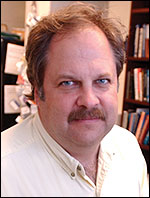Robert L. Galloway Jr. has accepted a position on the editorial board of Transactions on Biomedical Engineering, a journal of the Institute of Electrical and Electronics Engineers.

Galloway, whose expertise is in technology-guided therapies, medical devices and medical imaging, is a professor of biomedical engineering, professor of neurosurgery and professor of surgery at Vanderbilt University. He also is one of the principal founders of the Vanderbilt Initiative for Surgery and Engineering and director of the Center for Technology Guided Therapy.
“I’m honored to join a board full of people I consider leaders in biomedical engineering. I see this appointment as reflecting very well on the ongoing interactions between Vanderbilt’s School of Engineering and its Medical Center,” said Galloway, who has been asked by the journal’s editor to assemble a special issue on therapeutic devices.
TBME reported in 2012 that it is ranked No. 5 among 118 biomedical engineering journals according to Hirsch-index, a measurement of scholarly impact.
Galloway, a fellow of the IEEE and the American Institute for Medical and Biological Engineering, has edited four books, authored 14 book chapters, and published 130 manuscripts in refereed journals. He has presented results of his work at more than 94 scientific conferences. In addition, he holds nine U.S. and international patents on devices resulting from his research. Galloway is founder of Pathfinder Therapeutics Inc., which develops image-guided, computer-assisted surgical navigation systems
Galloway teaches courses in medical instrumentation, medical imaging, and therapeutic
bioengineering. He has received a research award and five teaching awards at Vanderbilt. His current research projects include image-guided liver and kidney surgery, and a novel drug delivery system to treat optic nerve disorders.
Galloway joined Vanderbilt in 1988 as an assistant professor of biomedical engineering. He earned a bachelor’s degree from Duke University, a master’s degree from the University of Virginia, and a doctoral degree from Duke, all in biomedical engineering.